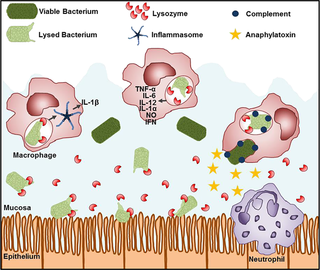PLoS Pathogens ( IF 5.5 ) Pub Date : 2017-09-21 , DOI: 10.1371/journal.ppat.1006512 Stephanie A Ragland 1 , Alison K Criss 1

|
Lysozyme is a cornerstone of innate immunity. The canonical mechanism for bacterial killing by lysozyme occurs through the hydrolysis of cell wall peptidoglycan (PG). Conventional type (c-type) lysozymes are also highly cationic and can kill certain bacteria independently of PG hydrolytic activity. Reflecting the ongoing arms race between host and invading microorganisms, both gram-positive and gram-negative bacteria have evolved mechanisms to thwart killing by lysozyme. In addition to its direct antimicrobial role, more recent evidence has shown that lysozyme modulates the host immune response to infection. The degradation and lysis of bacteria by lysozyme enhance the release of bacterial products, including PG, that activate pattern recognition receptors in host cells. Yet paradoxically, lysozyme is important for the resolution of inflammation at mucosal sites. This review will highlight recent advances in our understanding of the diverse mechanisms that bacteria use to protect themselves against lysozyme, the intriguing immunomodulatory function of lysozyme, and the relationship between these features in the context of infection.
中文翻译:

从细菌杀伤到免疫调节:溶菌酶功能的最新见解。
溶菌酶是先天免疫的基石。溶菌酶杀死细菌的典型机制是通过细胞壁肽聚糖(PG)的水解而发生的。常规型(c型)溶菌酶也是高度阳离子化的,可以独立于PG的水解活性而杀死某些细菌。革兰氏阳性和革兰氏阴性细菌都进化出阻止溶菌酶杀死的机制,这反映了宿主与入侵微生物之间正在进行的军备竞赛。除了其直接的抗菌作用外,最近的证据表明,溶菌酶还可以调节宿主对感染的免疫反应。溶菌酶对细菌的降解和裂解会增强细菌产物(包括PG)的释放,从而激活宿主细胞中的模式识别受体。然而自相矛盾的是 溶菌酶对于解决粘膜部位的炎症很重要。这篇综述将突出我们对细菌用于保护自身免受溶菌酶影响的各种机制,溶菌酶的有趣免疫调节功能以及感染情况下这些特征之间关系的理解的最新进展。











































 京公网安备 11010802027423号
京公网安备 11010802027423号